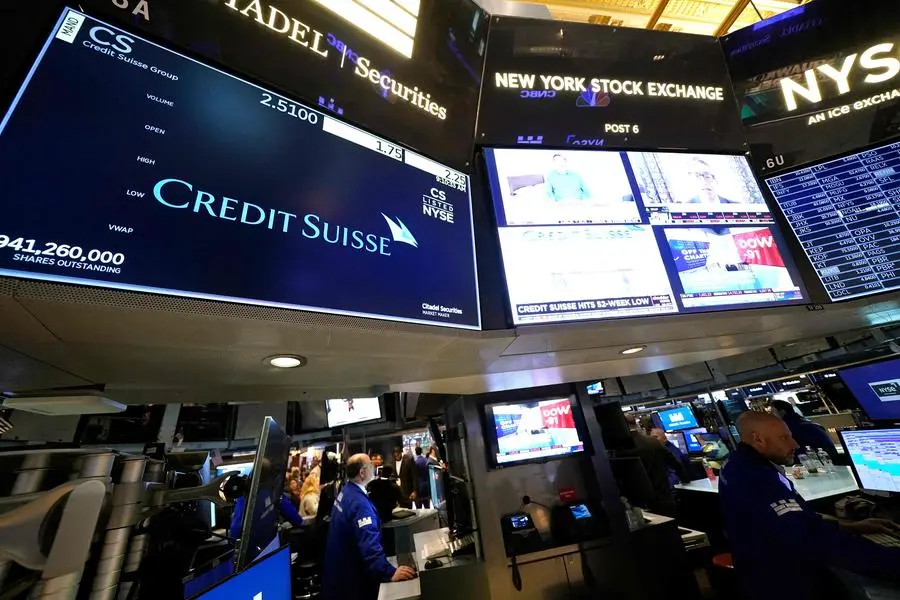PHOTO
World stock markets wavered Wednesday as investors dwelled on US recession concerns and a bumper interest-rate hike in New Zealand.
London rose but Frankfurt and Paris fell in muted trade during a holiday-shortened week.
Asian indices drifted after losses on Wall Street, as data showing a softening in the US jobs market pointed to a slowdown in the world's biggest economy.
Oil dipped, having spiked earlier this week following shock output cuts from OPEC+ crude producers.
"Markets are drifting as investor thoughts start to turn towards the scale of severity, as the likelihood of a recession later in the year in the US increases," said Richard Hunter, head of markets at trading firm Interactive Investor.
- New Zealand lift rates -
The central bank of New Zealand on Wednesday became the latest to hike interest rates sharply to tackle soaring inflation.
The Reserve Bank of New Zealand lifted its rate by a larger-than-expected 50 basis points to 5.25 percent.
"Central banks seem currently divided on whether inflation has peaked and therefore whether to tap on the tightening brakes," Hunter told AFP.
"The New Zealand decision is in contrast to the Australian decision to hold, and the market consensus is at the moment evenly split between whether the US Federal Reserve's next move is a final 0.25 percentage point rise -- or no action at all."
After March's banking sector-sparked turmoil, markets have enjoyed a few bright weeks on optimism the Fed will temper its interest rate hikes earlier than thought.
The rally continued at the start of this week, even after surprise cuts in oil output by major producers sent prices soaring and reignited worries over inflation, which has been coming down in the past months.
But New York traders turned sellers Tuesday after data showed February job openings at US companies fell to their lowest level since May 2021 and below forecasts.
While figures showing a strong labour market have been welcomed as giving the Fed room to stop hiking rates, analysts said the reading was also seen as a warning that the economy was on the slide.
- Gold sparkles -
The price of gold, considered a safe bet in times of economic turmoil, rose Wednesday toward a record peak, one day after breaking $2,000 per ounce.
Gold climbed as high as $2,028.44, a level last seen in early 2022 and not far from a record $2,075.47 set in August 2020.
"Investors fled to the yellow metal as a safe-haven play, given uncertainty about US growth expectations," said TickMill Group analyst Patrick Munnelly.
Fed Cleveland boss Loretta Mester warned that rates needed to go above the current five percent for the Fed to get control of inflation.
That message came despite worries about the banking sector, which saw the collapse of three US regional banks last month and the emergency buyout of Credit Suisse by Swiss rival UBS.
Traders were jarred by JPMorgan Chase chief Jamie Dimon's warning that the banking crisis "is not yet over" and that inflation could linger at high levels, extending the period of higher interest rates.
In Basel, UBS chiefs told shareholders on Wednesday that the takeover of Credit Suisse was a "Herculean task" strewn with risks, but still the right decision.
- Key figures around 1100 GMT -
- London - FTSE 100: UP 0.4 percent at 7,665.17 points
- Paris - CAC 40: DOWN 0.2 percent at 7,329.72
- Frankfurt - DAX: DOWN 0.4 percent at 15,549.40
- EURO STOXX 50: DOWN 0.2 percent at 4,304.91
- Tokyo - Nikkei 225: DOWN 1.7 percent at 27,813.26 (close)
- Hong Kong - Hang Seng Index: Closed for holiday
- Shanghai - Composite: Closed for holiday
- New York - Dow: DOWN 0.6 percent at 33,402.38 (close)
- Euro/dollar: DOWN at $1.0952 from $1.0953 on Tuesday
- Pound/dollar: DOWN at $1.2481 from $1.2501
- Euro/pound: UP at 87.75 pence at 87.62 pence
- Dollar/yen: DOWN at 131.64 yen from 131.71 yen
- Brent North Sea crude: DOWN 0.3 percent at $84.70 per barrel
- West Texas Intermediate: DOWN 0.5 percent at $80.32 per barrel




















